

Breaking the Mold: Democracy at Work. Breaking the Mold: Democracy at Work. Evergreen Cooperatives. The Evergreen Cooperatives are a connected group of worker-owned cooperatives in Cleveland, Ohio.
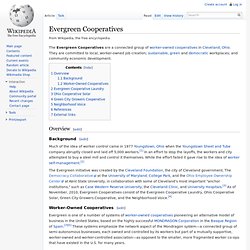
They are committed to local, worker-owned job creation; sustainable, green and democratic workplaces; and community economic development. Overview[edit] Background[edit] Much of the idea of worker control came in 1977 Youngstown, Ohio when the Youngstown Sheet and Tube company abruptly closed and laid off 5,000 workers.[1] In an effort to stop the layoffs, the workers and city attempted to buy a steel mill and control it themselves. While the effort failed it gave rise to the idea of worker self-management.[2] Worker-Owned Cooperatives[edit] Evergreen Cooperative Laundry[edit] Evergreen Cooperative Laundry (ECL) is an industrial laundry serving local hospitals, hotels, and other institutions. It saves 35% of energy by warming up the clean water with heat from the used water.[9][10]It eliminates hazardous waste by using EPA-approved chemicals.[9]
Cooperative. In short, a coop can be defined as "a jointly owned enterprise engaging in the production or distribution of goods or the supplying of services, operated by its members for their mutual benefit, typically organized by consumers or farmers.
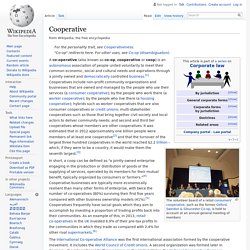
"[4] Cooperative businesses are typically more economically resilient than many other forms of enterprise, with twice the number of co-operatives (80%) surviving their first five years compared with other business ownership models (41%).[5] Cooperatives frequently have social goals which they aim to accomplish by investing a proportion of trading profits back into their communities. As an example of this, in 2013, retail co-operatives in the UK invested 6.9% of their pre-tax profits in the communities in which they trade as compared with 2.4% for other rival supermarkets.[6] The International Co-operative Alliance was the first international association formed by the cooperative movement.
It includes the World Council of Credit Unions. Mondragon Corporation. Mondragon cooperatives operate in accordance with Statement on the Co-operative Identity maintained by the International Co-operative Alliance.

History[edit] The determining factor in the creation of the Mondragon system was the arrival in 1941 of a young Catholic priest José María Arizmendiarrieta in Mondragón, a town with a population of 7,000 that had not yet recovered from the Spanish Civil War: poverty, hunger, exile and tension.[2] In 1943, Arizmendiarrieta established a technical college that became a training ground for generations of managers, engineers and skilled labour for local companies, and primarily for the co-operatives.[3] Before creating the first co-operative, Arizmendiarrieta spent a number of years educating young people about a form of humanism based on solidarity and participation, in harmony with Catholic Social Teaching, and the importance of acquiring the necessary technical knowledge. The first 15 years were characterised by enormous dynamism.
Workers' self-management. Self-management or workers' self-management (also referred to as labor management, autogestión, workers' control, industrial democracy and producer cooperatives) is a form of management that involves management of an organization by its workers.
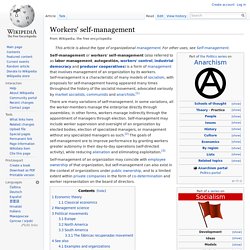
Self-management is a characteristic of many models of socialism, with proposals for self-management having appeared many times throughout the history of the socialist movement, advocated variously by market socialists, communists and anarchists.[1] There are many variations of self-management. In some variations, all the worker-members manage the enterprise directly through assemblies; in other forms, workers manage indirectly through the appointment of managers through election. Economic theory[edit] An economic system consisting of self-managed enterprises is sometimes referred to as a participatory economy, self-managed economy or cooperative economy.
Classical economics[edit] Category:Employee-owned companies. List of employee-owned companies. List of employee-owned companies From Wikipedia, the free encyclopedia Jump to: navigation, search This list is incomplete; you can help by expanding it.
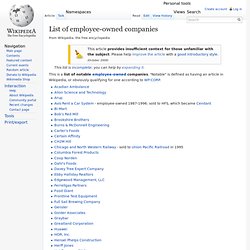
This is a list of notable employee-owned companies. "Notable" is defined as having an article in Wikipedia, or obviously qualifying for one according to WP:CORP. External links[edit] Retrieved from " Categories: Hidden categories: Navigation menu Personal tools. Employee stock ownership plan. ESOPs in the UK[edit] ESOPs became widespread for a short period in the UK under the government of Margaret Thatcher, and particularly following the Transport Act 1985, which deregulated and then privatised the bus services.
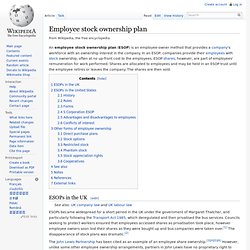
Councils seeking to protect workers ensured that employees accessed shares as privatisation took place, however employee owners soon lost their shares as they were bought up and bus companies were taken over.[1] The disappearance of stock plans was dramatic.[2] The John Lewis Partnership has been cited as an example of an employee share ownership.[3][4][5][6] However, unlike some other employee ownership arrangements, partners in John Lewis have no proprietary right to their stake, and cannot buy or sell their rights, nor collective dissolve the entity.[7] On 3 December 2012, the Government published its response to the consultation.
In April 2013, the Enterprise and Regulatory Reform Bill was passed and received Royal Assent. Worker cooperative. A worker cooperative is a cooperative owned and self-managed by its workers. This control may be exercised in a number of ways. A cooperative enterprise may mean a firm where every worker-owner participates in decision making in a democratic fashion, or it may refer to one in which managers and administration is elected by every worker-owner, and finally it can refer to a situation in which managers are considered, and treated as, workers of the firm. In traditional forms of worker cooperative, all shares are held by the workforce with no outside or consumer owners, and each member has one voting share. Definition of worker cooperative[edit] Many definitions exist as to what qualifies as a workers' cooperative. Workers' cooperatives also follow the Rochdale Principles and values, which are a set of core principles for the operation of cooperatives.
Economic forms & Ideologies. Co-ops ethical companies and other types of reforms.